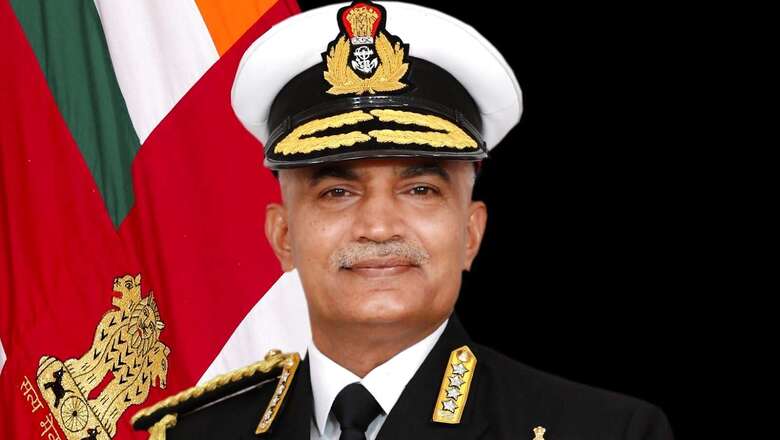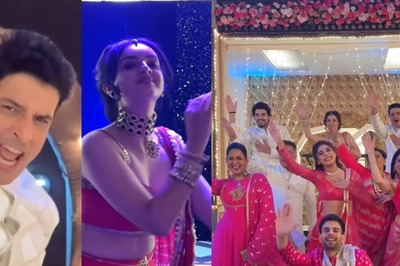‘We Believe in Rules-based International Order, PM’s Vision of ‘Sagar, Samridhi For All’: Navy Chief

views
Chief of Naval Staff Admiral R Hari Kumar said while the Indian Navy stood by Prime Minister Narendra Modi’s vision of ‘Sagar and samridhi for all’, it also believed in a rules-based international order. He said for India, the biggest learning from the Russia-Ukraine war was to keep ‘atmanirbhar’, or self-reliant, supply chains ready.
Ahead of Navy Day on December 4, Admiral R Hari Kumar spoke to CNN-News18 on board India’s biggest aircraft carrier INS Vikramaditya.
Here are excerpts from the interview:
The Indian Ocean Region has always been an area of interest for India, but there has been a lot of activity there in the last few months. What are our concerns about this region?
The Indian Ocean Region (IOR) has historically been important for us with regard to trade, connectivity and communication. India has been a key player in the IOR if you look back at our scriptures, even during the Chola period. When we switched over from sail ships to steel ships, we lost out on the Industrial Revolution. The British were able to conquer us from the sea. Today, we have to depend more on the seas.
A major part of our trade takes place in the IOR and, at any point of time, there are over 60 warships in this region because of our interests, shipping lines, etc. So, our responsibility is to ensure that this region remains secure and, as per India’s policy, we believe in everybody flourishing together. The rising tide lifts all boats, we have close cooperation with all friendly countries.
We have to engage with our partners through maritime cooperation, military exercises, security cooperation, bilaterals, multilaterals, training, and assistance in capacity building. We treat all with the due respect that they deserve and look at everyone as equal. Samman is most important.
What about the Indo-Pacific, especially when it comes to our interests?
It (Indo-Pacific) is a concept, the most important idea of our time. According to geography, we are at the centre of it. Now, if you look at the Indian Ocean and Pacific Ocean as one big entity, almost 70 percent of the area is covered under this idea be it population, gross domestic product, busiest ports among others. As our PM (Narendra Modi) said, oceans are a shared common heritage and when we talk about the Indo-Pacific, we believe in a shared, open, inclusive and rules-based order. We don’t support anyone who says existing international rules and declarations need to be thrown out of the window. These are historically developed conventions, so we have to use this for the benefit of everyone.
But the elephant in the room or rather the dragon in the room is that there are countries who do not go by the rulebook. How do we deal with them?
That’s the importance of dialogue, or ‘samvad’. There is constant effort to engage in talks, negotiate peaceful resolutions of disputes. As the PM says this is not the era of war, so we need to engage, keep talking and find a solution as well as agreeable points. For example, we had a disagreement with Bangladesh and the international decision went in their favour, so you have to reconcile with that.
The world, after a long time, is seeing a war. What is our lesson from this conflict?
We are in a highly connected world. The Russia-Ukraine war has affected supply of food grain and energy. The same will happen if there is a conflict in the Indo-Pacific, so this war has proven that it is easy to start a conflict but difficult to end it. Our biggest lesson from this war is to have reliable supply chains, and that can only happen if we are self-reliant.
This war has also shown us the new threat of drones. There are other technology-related challenges as well. Are we prepared?
Over the years, it has been shown that if a new technology emerges, it is disruptive. Technology is much cheaper, multiuse now and like a cat-and-mouse game. We are prepared; 166 new technology-related solutions have been ordered and we believe in ‘atmanirbharta’.
This year, we have sent ships to all continents. What was the thought behind it?
We wanted to show the reach and sustenance of the Indian Navy by sending ships to six continents and seven ports. By showing our flag, we engaged with our partner countries. The unique thing is that six out of seven ships that sailed were indigenous.
We are on board INS Vikramaditya and this carrier has also played host to some school students for the Navy Quiz. How did the idea of engaging with students on board come about?
We have been working on how to contribute to nation building on ‘Azadi ka Amrit Mahotsav’, so we thought we will harness the talent in schools. Our target was 7,500, we achieved 6,300. Our idea was to awaken maritime consciousness, so that you are aware of the value of oceans and seas. Once the ship leaves the harbour, no one is able to see what the navy does. So, we wanted to give an idea of what the navy does, how it affects your daily activities such as fuel supply, and how much effort goes in to keep the seas safe.
Read all the Latest India News here


















Comments
0 comment